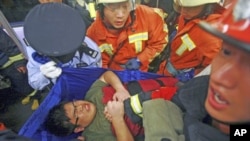The crash of two subway trains in Shanghai on Tuesday has rekindled an online debate in China about public transportation safety. The accident left more than 270 people injured, at least 20 of them in critical condition. Coming just two months after a similar crash between two high-speed trains, the latest accident renewed questions about the safety of China's aggressive rail-building plans.
Chinese state media say most of those who were injured have already been discharged from hospitals, but it is unlikely the social impact of the crash will fade quickly.
|
The subway crash has sparked many comments on China's microblogging Weibo site. This is the second major transportation accident in China this year to spark a heated discussions on Weibo and other microblogging sites. Here is a sample of the comments on Weibo following the subway crash. (The original Chinese is seen here, followed by the English translation) Lin Gengxin: 我看见好多警车 救护车 消防车 不下一百辆车 武警也出动了 场面极其混乱我 猜 测与地铁有关 祈祷 Responses to Shanghai Metro Apology DingDing Trucy 是该好好致歉了。在上海这个地方不是铁路事故就是地铁事故。事故越来越多 了。领导人都在干嘛。就知道欺诈老百姓的钱。出去玩逍遥。现在该领导发挥的时 候 了。不然国家都要毁掉了。 |
Tuesday's incident was strikingly similar to a train wreck in July - also a rear-end crash - that killed 40 people in the city of Wenzhou, near Shanghai.
The first wreck shattered public confidence in the nation's high-speed rail system and led to an outpouring of discussion and criticism of the government - both online and even in state media.
Photos and videos posted online soon after Tuesday's accident captured the commotion at the scene.
This video from the China Daily shows the rescue operation after the subway crash.
A woman subway passenger by the name of Chen described what she saw, saying the entire train cabin suddenly tilted, and the lights went out. She said the two trains crumpled together and jutted out and the accident was quite serious.
Shen Jun, another passenger, shared his experience, saying he was standing in the first passenger cabin, which rammed into the rear of the other train. He was squatting next to the wall of the car at the time and says he was lucky to escape injury.
Within a few hours more than a half million comments were posted on Weibo, the Chinese version of Twitter, with many people voicing concerns about the safety of China's public transport system.
One Weibo user named Joefaire asked how it could be that forms of public transportation long considered safe continue to have problems. She asked who would take responsibility.
A majority of those who answered an online poll about transportation safety said they only felt safe when staying at home. Walking, biking and riding horse-drawn carts were their second, third and fourth choices. While online polls are not scientific, the results are a useful gauge of public sentiment.
J.P. Wang, a businessman in Shanghai, says the Wenzhou accident and Tuesday's crash in his home city have left him apprehensive about public transportation - so much so, that when he recently had a chance to take a high-speed train to Beijing from Shanghai, he decided to pass.
"I think it is really challenging because we [China] developed so fast for hardware, with the new technology," said Wang. "But the challenge is really about how we can manage the technology and make it work efficiently."
As more people speak out, both online and in their communities, Wang says, it is guiding the government to address issues of vital importance to its citizens.
Just last month, thousands of residents in China's northeastern city of Dalian rallied in the streets to voice concerns about a chemical plant there. After a storm broke the dike around the plant, there were rising concerns that chemicals at the plant might get into the environment.
In response, officials agreed to shut down the plant and relocate it.
Following Tuesday's accident, Shanghai officials were quick to post an apology online and promised a thorough investigation.
Metro officials say one of the trains' signaling systems had failed, and at the time the accident occurred station officers were using telephones to direct approaching rail traffic.










